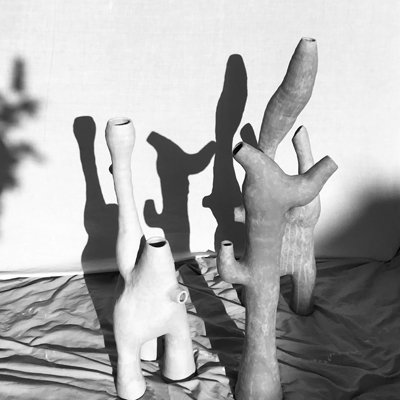2020 AWARD WINNER | Bath Spa University
Posted on - 9th September 2020

Saffron Summerfield | BA Hons Contemporary Art Practice
Bath Spa University
Tell us about yourself, your work, and your career path so far.
I was brought up in home a educated family by my parents and six other siblings, this gave me the opportunity to enjoy an alternative form of learning, based in a non-judgmental environment, enabling experimentation and total creative freedom.
I found Art naturally became a big part of my life and where I felt most comfortable in my abilities, so at the age of 16 I started college where I studied art and design for two years and then went on to study a BA hons Degree in Contemporary art at bath spa university.
I find my practice often explores reoccurring themes relating to ethical and environmental issues but more specifically in my recent work has been centred around the idea of the ‘Technofossil:’ objects which are manufactured specifically for human use, to facilitate or enhance contemporary existence, and having outlasted their original function, are thoughtlessly discarded Into our environment.
Describe your first encounter with clay
Clay is a medium I have always been familiar with, I can’t say I recall the very first encounter exactly, but as a young child I do remember my siblings and I digging down into the bottom of a muddy sea cliff and collecting gritty lumps of unrefined clay.
We would then use the this along with pebbles from off the sea shore to build miniature stone fire pits with little chimneys and an entrance point for supplying the wood.
After it was built, we then sculpted little figures and abstract forms and attempted to fire the objects in the pit overnight.
Why did you choose ceramics?
Ceramics has always been one of my favourite mediums.
Ever since I was young and I used to attend pottery classes, I have just had the urge to use clay where and whenever I could, and despite the fact I studied Art in a broader sense I knew inevitably I would finish my degree working with ceramics because it’s a process I have always felt naturally drawn to.
There is something so special about seeing an idea transform from being a soft malleable lump into a hard and durable piece of ceramic, and there are so many different stages of the process in which things can go wrong or right which make it extra exciting!
Where do you find inspiration? Places, people, objects, music...
I take a lot of my inspiration from things I find; nature is often a big influence as is junk. I collect objects and discarded material from urban environments. This becomes a key part of my practice through the casting and mould making process. I like the idea of combining organic forms with hints of manmade materials to create more unusual and abstract structures.
What are the tools of your trade that you can't do without?
Steel kidney!!! This is by far my favourite and most used tool, however I would say for the most part I just use my hands.
What is a typical day in the studio like?
I usually go in with a mini plan for the day, I start by completing a few things I need to get done, like glazing or finishing a mould in the morning and then after I spend my time relaxing into a hand build.
I often begin with a rough design from which I start making, then, during this process I frequently stop to redraw what I have made along with new ideas and adaptations. This allows the form to naturally develop as I go along. Drawing is a big part of my practice and is just as important as the other element of my work.
What do the next 12 months have in store for you?
I am currently in the process of moving to Manchester where I aim to continue furthering my Art and ceramic practice. Hopefully I will be able to find a local studio to complete some of the work I have made up to date. I also would like to try and exhibit throughout the year and then either apply to a master’s degree or a residency in 2021.
What advice do you have for those currently studying ceramics in further education?
I would encourage anyone starting out in ceramics to spend as much time in the studio as they can, don’t just assume you will automatically understand the material and its processes straight away, it takes time to get to know how each individual technique is applied to both You and the clay, it’s a combination of the two meeting together in the right way which makes things work!
Try and be as diverse and experimental as possible, there is a lot of useful information out-there that can help you become a brilliant ceramicist but always remember to add your own twist on things and make it your own.


